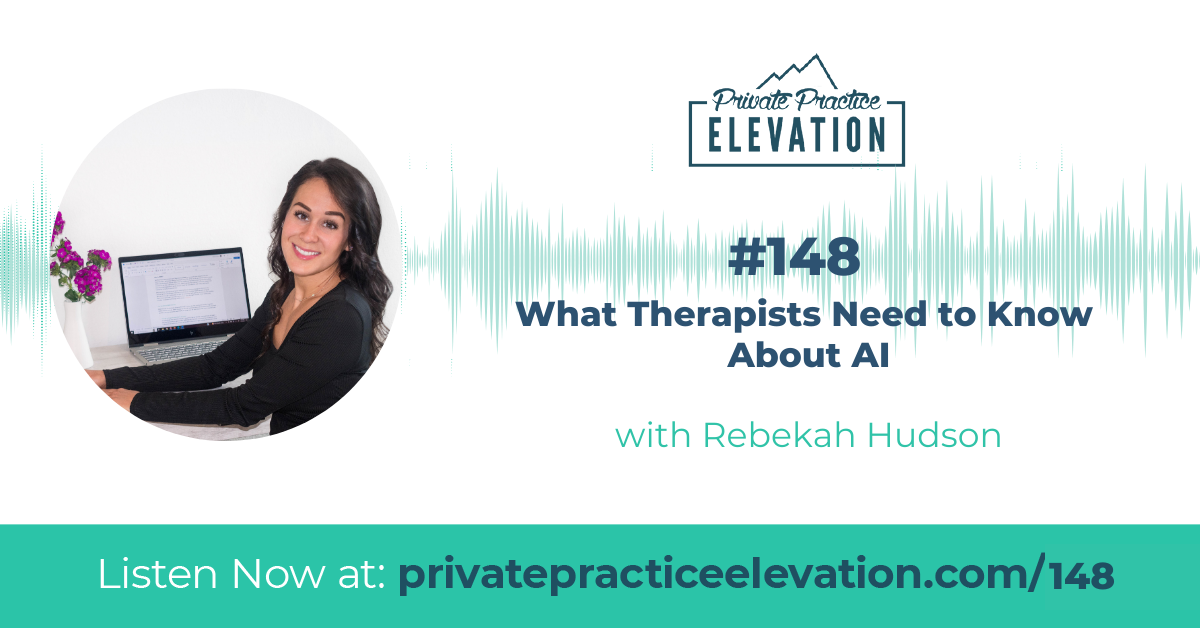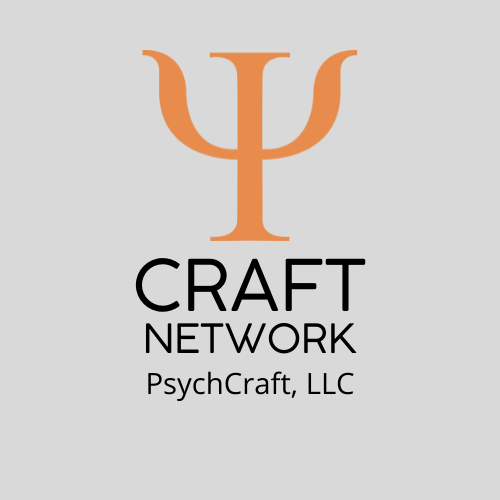In this episode of The Private Practice Elevation Podcast, we’re going to dive deep into what therapists need to know about using AI for writing their marketing material.
Artificial intelligence (AI) has become a prominent tool in various industries, including marketing. AI writing generators have gained popularity, offering a solution for those who struggle with writing or need content quickly.
AI has simply changed content creation forever. The amount of time AI can save you as you create content, such as articles for your website and social media posts, is amazing. And it can be really tempting to outsource all your marketing copywriting to this powerful new tool.
But before you hand the keys over to ChatGPT or other tools, it’s important to understand the limitations and the ethics of using AI.
My conversation with Rebekah Hudson, a freelance marketing professional in the mental health industry, discusses the ethical concerns and limitations of using AI writing in marketing for therapists.
She highlights the controversy surrounding AI writing and the potential for plagiarism. She also explains the limitations of AI writing, including issues with quality, accuracy, originality, brand voice, and search engine optimization. Despite these limitations, she offers tips for using AI writing effectively, such as fact-checking and using multiple plagiarism-checking tools. Hudson emphasizes the importance of maintaining a unique and authentic brand voice in order to connect with clients.
What You’ll Learn About AI:
- Introduction to the topic of AI in marketing
- Ethical concerns surrounding AI writing
- Ownership and copyright issues with AI-generated content
- Concerns about the credibility and reputation of AI-generated literature
- The Five major limitations of AI writing
- Suggestions to avoid relying on AI writing for SEO
- The importance and irreplaceable need for the human element in writing
- Top Tips for using AI writing effectively.
- Tips include fact-checking and not relying on AI as an editor
- How to compare AI-generated content with human-written content to determine quality.
- Recommended tools for plagiarism checking include Grammarly and DupliChecker.
This Episode is Brought To You By
Alma is on a mission to simplify access to high-quality, affordable mental health care by giving providers the tools they need to build thriving in-network private practices. When providers join Alma, they gain access to insurance support, teletherapy software, client referrals, automated billing and scheduling tools, and a vibrant community of clinicians that come together for education, training, and events.
Alma gives clinicians the tools they need to build thriving private practices. When you join their insurance program, you can get credentialed within 45 days, and access enhanced reimbursement rates with major payers. They also handle all of the paperwork, from eligibility checks to claims submissions, and guarantee payment within two weeks of each appointment.
In addition to their insurance program, Alma offers timesaving tools and administrative support — so you can spend less time on paperwork, and more time delivering great care to your clients.
Learn more about building a thriving private practice with Alma at helloalma.com/elevation.
Links mentioned in this episode:
About Rebekah Hudson
Rebekah Hudson is a freelance copywriter, mental health columnist, and storyteller on a mission to help empower the world through healing, SEO-friendly content. Her professional background includes marketing, branding, and corporate communications.
Key Takeaways: What Therapists Need to Know About AI
The Ethical Controversy
One of the main ethical concerns surrounding AI writing is the issue of plagiarism. AI writing generators scrape content from various sources, including the World Wide Web, books, and medical journals. This raises questions about who owns the copyright of the generated content and whether it constitutes plagiarism. While there are no formal legal mandates regarding AI writing and plagiarism, many writers and industry professionals argue that it is a form of illegal plagiarism. The lack of clarity regarding copyright ownership and the use of others’ work without consent contribute to the ethical controversy surrounding AI writing.
Another ethical concern is the potential loss of credibility and reputation for writers and publishers. As AI-generated content becomes more prevalent, there is a fear that published literature and articles sourced from AI may face challenges in terms of credibility, eligibility for awards, and scholarly recognition. The lack of human input and the reliance on scraped content from various sources can undermine the quality and authenticity of the writing, leading to potential reputational damage in the long run.
Limitations of AI Writing
While AI writing generators make lofty claims about their capabilities, there are several limitations that mental health practitioners should be aware of. The first limitation is the quality of the writing. AI-generated content often lacks depth and reads like a stream of consciousness. The intros and closings are weak, and the grammar can be bizarre at times. The lack of a human touch and the inability to produce writing that resonates with readers are significant drawbacks of AI writing.
Accuracy is another limitation of AI writing. Complex and sensitive topics, such as those related to mental health, require careful handling and accurate information. AI tends to oversimplify complex topics or produce inaccurate information, relying on scraped content from the internet. This can lead to misleading or incorrect information being presented to readers, which is a significant concern for mental health practitioners who strive to provide reliable and accurate information to their clients.
The issue of originality is also a limitation of AI writing. While AI writing generators claim to produce unique and organic content, they often rely on preexisting content and rephrase it. This raises questions about the authenticity and originality of the generated content. Many writers argue that AI-generated content is not truly unique or organic, as it is based on scraped content from other sources.
Brand voice is another aspect that AI writing struggles to replicate. Many brands have a distinct brand voice that sets them apart from their competitors. AI writing generators claim to mimic or match the author’s unique voice and tone, but they often fall short in delivering on this promise. Copying someone else’s brand voice is not strategic and can undermine a brand’s uniqueness and authenticity.
Finally, the impact on search engine optimization (SEO) is a significant consideration for mental health practitioners. While Google has stated that it does not care how content is generated as long as it is high quality, reliable, and unique, AI-generated content often falls short in meeting these criteria. Generic content produced by AI writing generators is unlikely to perform well in terms of SEO, as it lacks the depth, uniqueness, and human touch that search engines value.
Tips for Using AI Writing Effectively
While AI writing has its limitations, there are ways to use this technology effectively. Here are some tips for mental health practitioners:
- Don’t assume that AI writing is always grammatically correct. Use tools like Grammarly to check for grammatical errors and ensure the phrasing is well-written.
- Don’t rely on AI to be your editor or fact-checker. Always fact-check the content, especially for complex or sensitive topics, and use reputable sources to support your claims.
- Keep in mind that AI writing is not fluent in any language. If English is not your first language and you struggle to write in English, AI writing may not be the best solution for achieving fluency. Consider hiring a professional writer or working with an editor to ensure your content reads like it was written by a native English speaker.
- Remember that AI writing is not a replacement for your unique brand voice. Focus on developing and maintaining your own brand voice to differentiate yourself from competitors and connect with your target audience.
- Put AI writing to the test. Use AI writing generators to produce a first draft or outline, but then go through and add your own human touch, edit, and fact-check the content. Compare the final product with content written by a professional writer or yourself to determine which better embodies your brand, resonates with your target audience, and meets your business goals.
Conclusion and Future Outlook
AI writing generators offer a convenient solution for those who struggle with writing or need content quickly. However, mental health practitioners should be aware of the ethical concerns and limitations associated with AI writing. Plagiarism, loss of credibility, lack of originality, and the inability to replicate brand voice are significant drawbacks of AI writing. While AI writing can be a useful research tool or launchpad for content creation, it should not be seen as a replacement for human-written, custom content. Mental health practitioners should strive to provide high-quality, reliable, and unique content that resonates with their target audience and sets them apart from their competitors. By understanding the limitations of AI writing and using it effectively, mental health practitioners can navigate this evolving technology and make informed decisions about its use in their marketing strategies.




